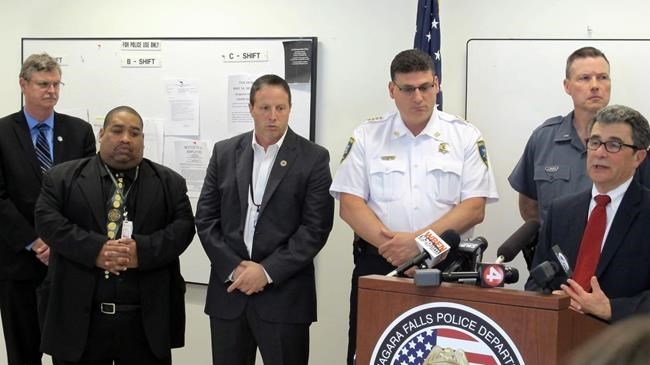
Assistant Niagara County District Attorney Robert Zucco, right, announces the indictment of a suspect in the assault and robbery of a Japanese tourist at Niagara Falls State Park, Thursday, May 12, 2016. Koyuki Nakahara, who was violently thrown down then robbed of her purse and shoes in December, returned to Niagara Falls to face her attacker so the changes wouldn't be dismissed. Behind Zucco are from left: Niagara Falls Mayor Paul Dyster, Niagara County Legislator Owen Steed, Niagara County Legislator Jason Zona, Niagara County Sheriff James Voutour and Lt. Patrick Moriarty of the New York State Park Police. (AP Photo/Carolyn Thompson)
Republished May 12, 2016 - 7:45 PM
Original Publication Date May 12, 2016 - 7:15 AM
NIAGARA FALLS, N.Y. - After being violently thrown to the ground and robbed of her purse and shoes during her first visit to Niagara Falls, Japanese tourist Koyuki Nakahara thought she would never return.
Yet she was back in New York last week, this time at the request of prosecutors who said her testimony was crucial in making sure her attacker would be punished.
"If I did not come back he would be released. It wasn't fair," Nakahara said by phone Thursday, the day prosecutors in Niagara County announced an indictment in the case.
Robert Macleod, of Niagara Falls, was indicted on charges of robbery, robbery as a sexually motivated felony, sexual abuse and assault. He was arrested Dec. 31 after police released pictures from surveillance cameras, and he pleaded not guilty to robbery and assault and was released on $25,000 bail.
A phone listing for Macleod wasn't available, and the attorney who represented him when he was arrested didn't respond to phone messages seeking comment. Arraignment on the new charges is expected this month.
Deputy District Attorney Doreen Hoffman said that without Nakahara's return to testify last week "the case likely would have been dismissed with no conviction."
"Under the Constitution, you have the right to confront your accuser, and we can't indict a case based on hearsay," Hoffman said. "We can't just put in written statements given by victims."
It's a right that can embolden criminals who target tourists, Hoffman said.
"Criminals don't anticipate them to be here to prosecute," she said.
Nakahara returned to the place where the man she'd asked for directions on Christmas night responded by pounding her face into the concrete and dragging her into the dark, where she feared she would be raped.
"I don't have to go. Just forget it," Nakahara had told herself at home in Tokyo, convinced she had put the attack, which left her bruised and frightened, behind her.
Then a Skype call with prosecutors who asked her to recount details brought home how deeply she'd been affected. Testifying would make Niagara Falls safer for other women and would prove empowering for her, she decided.
"I decided it's OK to show my feelings and let the criminal know you cannot do that," she said. "You cannot hurt me because I am a woman, I'm not as strong as you or I'm not living here or whatever."
During a news conference Thursday, authorities praised Nakahara's bravery and said they were happy to pay the travel costs to bring her back to the United States.
"To step on a plane and travel for days to come back to an area that certainly, unfortunately, does not have pleasant memories and meet some people that she barely knew and relive the events that she'd rather forget — wow," Assistant District Attorney Robert Zucco said.
Robberies and assaults are relatively rare in Niagara Falls State Park, state statistics show. From 2011 to 2014, state parks police received an average of two reports of robberies involving the use or threat of violence and no more than one report of assault each year. Niagara Falls Mayor Paul Dyster, a Democrat, called the chances of being victimized "exceedingly low," especially considering the influx of 8 million to 9 million tourists each year.
Nakahara had been travelling with a tour group when she ventured out of her hotel on her own and became lost. The stranger she asked to point her in the right direction at first seemed helpful. Then he pulled her hair and pushed her down to the ground. When he dragged her to a dark and secluded area, she was sure she would be raped and wondered if she would survive. But her attacker eventually fled, and she was taken to a hospital.
The Associated Press generally doesn't identify people who say they're victims of sexual abuse, but Nakahara has said she wanted to discuss her case publicly.
Nakahara later continued on with her trip, which included stops in Los Angeles and Las Vegas, not wanting to be deprived by the attack of her chance to enjoy her travels.
News from © The Associated Press, 2016